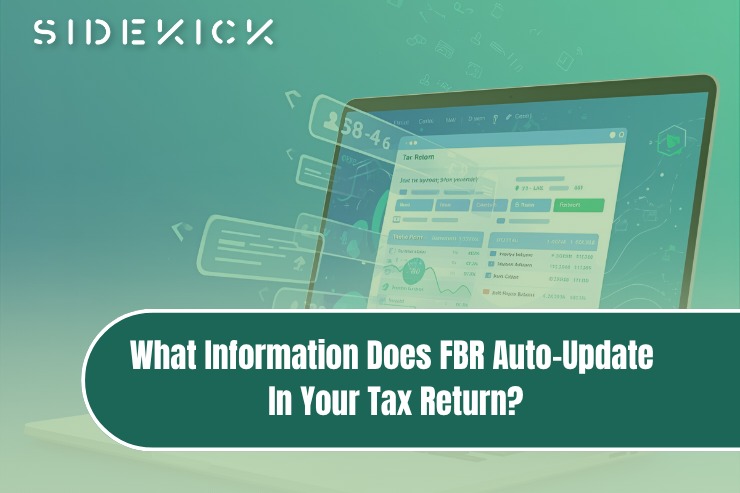In Pakistan, filing means more than obeying tax laws. It creates opportunities for financial advantages like reduced withholding taxes and simplified access to government services. As opposed to non-filers, taxpayers avoid penalties and additional taxes.
Filing is important for ensuring financial health and reputation, whether you are a business or an individual. This article explains how to become a filer in Pakistan while helping you stay compliant.
Step 1: Get Your National Tax Number
Getting a National Tax Number (NTN) is your first step in beginning your tax filing process. NTN is necessary when filing your taxes. The FBR online portal can be used to get the NTN.
Registration for the NTN requires the submission of your CNIC, email address, contact number, and current address. Once you complete the form, you will receive two verification codes sent to your email and contact number. Make sure you provide correct details otherwise it can lead to fines from the FBR. After verifying those codes, you will receive a password from the FBR.
Receiving that password means that you have been registered with the FBR. This is how you get your NTN number.
Step 2: Complete Your FBR Filer Registration Online
Tax filing requires an account on the FBR’s online portal, IRIS. Sign in on the portal. You have to provide your details and your account will be created without any FBR registration fee. After signing up, finish your profile on the IRIS portal.
Documents that would complete the registration process included a scanned copy of your CNIC and proof of earnings in salary slips or business earnings. After submitting your documents, they are verified. Once done, you can start filing your taxes.
Step 3: Register Your Income Tax Return
You can file your first income tax return as soon as you register on the IRIS portal. After logging in, you will find the Declaration tab and select Income Tax Return. There are then options for a salary return or a business return. Choosing any will open form 114 for the income tax return.
For salaried people, you must provide documents according to your record, such as a tax deduction certificate from their employer, bank statements, and a list of assets with their purchase values and utility bills.
Business owners must collect proof of tax deduction, summarized net sales invoices, expenses, and details on bank transactions and assets as of June 30th. These documents are required for your records. You do not need to attach any documents. However, Business owners need to show their profit and loss and attach it to the form.
Additional documents like tax deductions certificated from mobile carriers or receipts from overseas remittances will strengthen your filing.
The FBR has given an extension for filing taxes by October 14th. File your tax now to be on the active taxpayer’s list.
Step 4: Submitting the Wealth Statement
To report your assets and liabilities in your wealth statement, submit it with your income tax return. A wealth statement summarizes your financial position by mentioning property assets, vehicles, liabilities, and bank balances. The wealth statement plays a crucial role in maintaining clearness and following tax rules in Pakistan. You do not have to open any new tab for the wealth statement. It is already attached with the ITR form at the end.
By precisely reporting all assets, you help the Federal Board of Revenue (FBR) observe your wealth growth. You must submit an accurate wealth report to maintain your active tax status and become a filer in Pakistan
Want to Become a Filer in Pakistan?
Get in Touch
Fill out the form below, and we will be in touch shortly.
Status of Being a Filer
It is important to note that if you are filing for the year 2024, your filer status will show after the extended due date. If you are filing for the first time and want immediate filer status, you need to file your return for 2023 as well. Moreover, you will also have to pay a default surcharge challan of Rs 1000. After submitting the challan, you will get your filer status within 24 hours.
Please note that if you file your taxes after the due date, you will have penalties of Rs 1000 for individuals, Rs 10,000 for AOPs, and Rs 20,000 for private limited companies. After paying these fines, you will get the status of a late filer. Filing taxes late will always give you late filer status, so get professional help from Sidekick and get your active tax filer status now.
Benefits of Becoming a Filer in Pakistan
In Pakistan, filing taxes has multiple advantages. Individuals who file taxes avoid higher taxes on banking and buying real estate. Owners can purchase homes and cars free from extra taxes for non-filers.
Being included in the Active Taxpayer List improves your financial reputation. Tax filers in Pakistan receive opportunities for tax refunds and fewer deductions from their earnings due to filing their taxes on time. Filling out your tax forms pays off financially for both individuals and companies.
Sidekick’s Tax Filing Services
In Pakistan, Sidekick enables individuals and businesses to file taxes by providing top-notch tax assistance. By taking care of everything from FBR registration to dealing with tax-related problems, Sidekick makes the entire experience comfortable.
In addition to filing services, we offer valuable assistance when applying for tax refunds. So, choose Sidekick and become a filer in Pakistan.
Conclusion: Stay Compliant and Reap the Rewards
Becoming a filer in Pakistan provides financial and legal benefits, such as lower taxes and increased chances. Following tax rules will keep you from incurring penalties and provide you with enduring perks. Reach out to experts like Sidekick to ease and simplify your tax returns.







